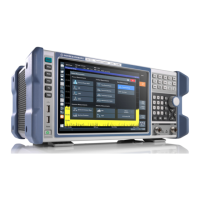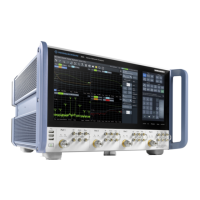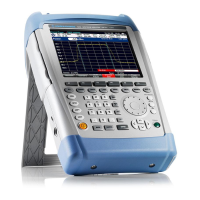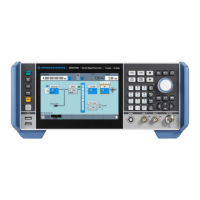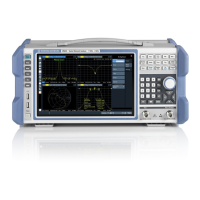Measurement of Harmonics R&S FSL
1300.2519.12 2.4 E-11
Note: If the harmonic emerges from noise sufficiently (approx. >15 dB), it is easy to check (by
changing the RF attenuation) whether the harmonics originate from the DUT or are generated
internally by the spectrum analyzer. If a harmonic originates from the DUT, its level remains
constant if the RF attenuation is increased by 10 dB. Only the displayed noise is increased by
10 dB due to the additional attenuation. If the harmonic is exclusively generated by the
spectrum analyzer, the level of the harmonic is reduced by 20 dB or is lost in noise. If both – the
DUT and the spectrum analyzer – contribute to the harmonic, the reduction in the harmonic
level is correspondingly smaller.
High–Sensitivity Harmonics Measurements
If harmonics have very small levels, the resolution bandwidth required to measure them must be
reduced considerably. The sweep time is, therefore, also increased considerably. In this case, the
measurement of individual harmonics is carried out with the R&S FSL set to a small span. Only the
frequency range around the harmonics will then be measured with a small resolution bandwidth.
Signal generator settings (e.g. R&S SMU):
Frequency: 128 MHz
Level: – 25 dBm
Procedure:
1. Set the R&S FSL to its default state.
Press the PRESET key.
The R&S FSL is set to its default state.
2. Set the center frequency to 128 MHz and the span to 100 kHz.
Press the FREQ key.
The frequency menu is displayed.
In the dialog box, enter 128 using the numeric keypad and confirm with the MHz key.
Press the SPAN key.
In the dialog box, enter 100 using the numeric keypad and confirm with the kHz key.
The R&S FSL displays the reference signal with a span of 100 kHz and resolution bandwidth of
3 kHz.
3. Switching on the marker.
Press the MKR key.
The marker is positioned on the trace maximum.
4. Set the measured signal frequency and the measured level as reference values
Press the Phase Noise/Ref Fixed softkey.
The position of the marker becomes the reference point. The reference point level is indicated
by a horizontal line, the reference point frequency with a vertical line. At the same time, the
delta marker 2 is switched on.
Press the Ref Fixed softkey.
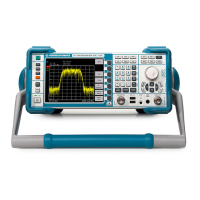
